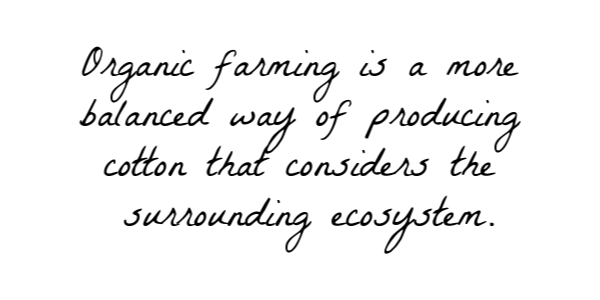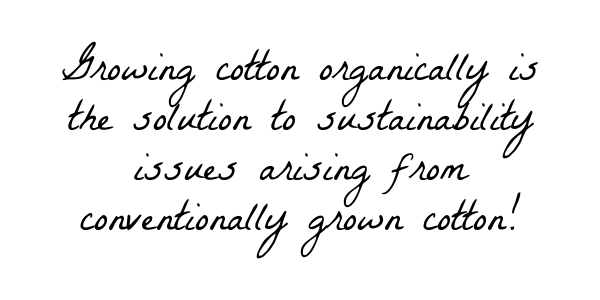Are you looking for the best choice for your baby's delicate skin and the environment? Look no further than organically grown cotton. This sustainable and eco-friendly option offers a myriad of benefits that go beyond traditional cotton.
Organically grown cotton is produced without the use of harmful pesticides, herbicides, or chemical fertilisers, making it a safer choice for your baby's sensitive skin. By choosing organic cotton, you can reduce the risk of skin irritations, allergies, and respiratory problems that can be caused by the residues often found in conventionally grown cotton.
Furthermore, organic cotton farming practices promote healthier soil, conserve water, and protect biodiversity. They also support fair labor practices, ensuring a better future for cotton farmers and their communities.
Choosing organically grown cotton for your baby's clothing, bedding, and accessories not only creates a nurturing environment for your little one but also makes a positive impact on the planet. So, make the switch to organic and enjoy the peace of mind that comes with knowing you are making a sustainable choice for your baby and the environment.

‘Theirs no beauty in the finest cloth if it makes hunger & unhappiness’ ~ Mahatma Gandhi. Which is why Blue Brontide only uses natural fibres of hemp, cotton or linen, grown organically, GOT's certified, chemical-free from renewable sources.
So what exactly is Organic Cotton . . .
Organically grown cotton is produced using organic farming methods that focus on sustainability and environmental stewardship. Unlike conventionally grown cotton, which relies heavily on synthetic pesticides, herbicides, and chemical fertilisers, organic cotton is cultivated using natural and biological processes. Methods such as beneficial insect releases, strip cutting of alfalfa and new weeding machinery help reduce the environmental impact of cotton crops. With cotton which is organic and Fairtrade considered the ‘gold standard’ for sustainable cotton!
Organic cotton farmers prioritise soil health and fertility by using compost, crop rotation, and natural pest control. They avoid genetically modified seeds and synthetic chemicals, which helps maintain the integrity of the cotton fibers and minimizes the environmental impact of cotton production.
The organic farming methods used in growing cotton prioritize long-term sustainability and promote biodiversity. By working with nature rather than against it, organic cotton farming contributes to healthier ecosystems and supports the overall health of the planet.


So what's the issue with regularly grown cotton . . .
Conventionally grown cotton uses enormous amounts of pesticides, which are damaging to the surrounding ecosystem, the people who work/live in the vicinity of these chemicals being used and also the soil quality, add to this Pesticide resistance ‘the decreased susceptibility of a pest population to a pesticide that was previously effective at controlling the pest’ and eventually it will lead to decreased crop production. So whilst the use of pesticides, herbicides and fungicides helps with a bumper crop initially, in the long run, it's just not a sustainable method of farming! Once cotton is harvested it's processed using ammonia and formaldehyde, petroleum scouring agents & ammonia continuing the onslaught of chemicals released into the environment & with possible residues left on the cotton that could potentially be absorbed into the skin posing significant risks to farmers, workers, and nearby communities. Prolonged exposure to these chemicals can lead to acute and chronic health issues, including respiratory problems, skin irritations, and even cancer.
Conventional cotton farming also requires large amounts of water, often leading to excessive water consumption and depletion of freshwater sources. In regions where water scarcity is already a concern, the water-intensive nature of cotton cultivation exacerbates the problem and puts additional strain on local communities.


So why is it important to choose organic for our children . . .
- º Their's nothing nasty lurking in natural organic fabrics! Chemicals can be absorbed by our skin into our bloodstream from conventionally grown cotton ( one of the most heavily pesticide-treated crops in the world) and even inhaled causing skin allergies and respiratory issues. A baby's skin is a lot more delicate than an adults so is even less resistant to harmful substances causing a greater risk for pesticide-related health problems than adults.
- º It's GM-free! Franken crops as they have ominously been nicknamed now make up over 90% off all cotton growth in India and 30% of all cotton growth worldwide. We are yet to know the full implications of genetically modified cotton/crops but most deem GM a potential risk to wildlife and human health!
- º Its better quality. Mariusz Stochaj from Continental Clothing states “…when compared like-for-like, organic fibres consistently produce better quality yarns than conventional cotton.” Buying organic may be a little more expensive but wash per wash will last a lot longer than conventional cotton as it's not been through the extensive production of bleaching, dyeing, scouring that none organic cotton goes through before its even ready to sell.
- º Working environments are better for those on farms without the use of chemicals found in – pesticides, herbicides, fungicides – which can reportedly cause regular acute and chronic health problems especially in countries where cotton is still hand-picked.
- º A healthier eco-system as theirs no chemicals leaking into the water system and improved soil health.

Choosing organically grown cotton goes hand in hand with supporting fair trade and sustainable farming practices. Many organic cotton farmers prioritise fair labor conditions and work towards improving the livelihoods of cotton farmers and their communities.
By purchasing organic cotton products from brands that value fair trade, you are contributing to a more equitable and sustainable global cotton industry. Fair trade ensures that farmers receive fair wages, have access to safe working conditions, and are empowered to invest in their communities.
Supporting sustainable farming practices also means encouraging responsible land management and promoting biodiversity. Organic cotton farming methods prioritize soil health and fertility, using natural techniques to maintain the long-term productivity of the land.
Furthermore, many organic cotton initiatives invest in community development projects, such as education and healthcare programs, to improve the well-being of cotton farming communities. By choosing organic cotton, you are actively supporting these initiatives and helping create a better future for cotton farmers and their families.
Choosing organically grown cotton for your baby's clothing, bedding, and accessories is a conscious decision that benefits both your little one and the environment. Organic cotton offers a safer and healthier option for your baby's delicate skin, reducing the risk of skin irritations, allergies, and respiratory problems.
Moreover, organic cotton farming practices promote soil health, conserve water, and protect biodiversity. By choosing organic, you are supporting sustainable farming methods that have a positive impact on the planet.
When shopping for organic cotton products, look for reliable certifications such as GOTS and USDA Organic to ensure the authenticity of the organic claim. Supporting fair trade and sustainable farming practices further contributes to a more ethical and sustainable cotton industry.
If you're looking for alternative fabrics, consider options like bamboo, hemp, Tencel, or organic wool. These fabrics offer unique benefits and are more sustainable compared to conventional cotton.
By caring for and prolonging the life of your organic cotton products, you can further reduce waste and minimise your environmental impact.
So, make the switch to organically grown cotton and enjoy the peace of mind that comes with knowing you are making a sustainable choice for your baby and the environment. Your conscious decision today will contribute to a healthier future for generations to come.
Soft on Baby, Gentle on the Earth
Choose organic cotton that cares — for your little one’s skin and for the planet. Our soother clips are crafted from certified organic fibres, free from harmful dyes and designed for everyday comfort.
Explore Organic Soother Clips



